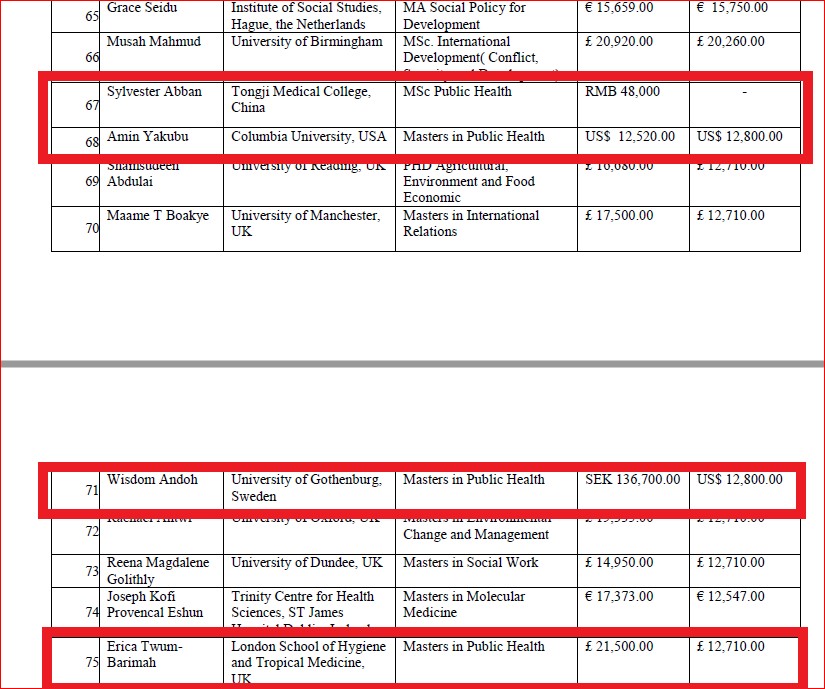A medical doctor, Dr Fathia Kareem, who graduated top of her class has told a story of how she was denied Ghana Education Trust Fund (GETFund) scholarship to study abroad.
Dr Kareem, who swept 12 out of 15 awards at the Kwame Nkrumah University of Science and Technology (KNUST) in 2016, was sidelined while politicians and politically connected persons enjoyed from the scheme reserved for the brilliant but needy.
She may have shattered the record of eight awards won by a single person at her college in KNUST, but her brilliance was not enough motivation to win her a GETFUND sponsorship.
Eventually, she had to forgo admission offers for Masters in Public Health at the Johns Hopkins University, not once – twice.
Narrating her story on Newsfile, Joy TV’s current affairs programme on Saturday, March 7, Dr Kareem said she had considered GETFund after applying to some schools abroad in 2018.
She spoke to a few people who had previously applied for the GETFund scholarship.
The feedback was not encouraging as they told her “GETFund was not giving as much support as it used to.” But she applied, anyway.
Document: How GETFUND ‘gifted’ more than 1,200 scholarships without seeing admission letters
She said she received an email from the Johns Hopkins University in the US, following an offer of admission to read a Public Health programme.
The manager told her she was part of the top three applicants who had been selected from Ghana.
“Over there, their mindset was that, in Ghana, Ghanaian students get support from GETFund so getting funding should not be a problem,” the young medical doctor recounted.
Three weeks after submitting her document to GETFund, she said she called to do a follow-up but was told a decision had not been made her application. She went there in person subsequently, but there were delays and the deadline for commencement of the programme elapsed, so she had to defer to the following year.
In 2019, the Senior Programme Manager for the Public Health programme at the Johns Hopkins University told her that some Ghanaians had received funding the previous year, but he did not understand why she was not considered. He gave her the contacts of the GETFund beneficiaries, hoping they could help her.
“I spoke to about two of them; one of them actually got a stipend but I think two of them got half or part of their tuition from GETFund. They told me it was a struggle because they had to go to the [GETFund] offices frequently. For over two months they kept going there, and in the end, it gave them the scholarship,” she recalled.
According to her, she unexpectedly received a LinkedIn request afterwards from the account of the Minister of Education, which got her elated because she had been seeking an opportunity to meet the minister personally to explain her challenge.
“I’m not sure if he sent it personally or his handlers sent it, but either way, I received it [the request].”
After explaining her situation, she said the minister told her that no scholarships were available for studies in the U.S, but specific grants were being issued.
Beneficiaries were not only selected based on academic achievement but also the relevance of the course for national development and the non-availability of the programme in Ghanaian universities, Dr Kareem recollected her conversation with the minister.
She made another attempt via her father, who was in Accra the following year. By then, she was outside the capital.
According to her, someone at the GETFund secretariat told her father, “it would be better if he knew someone who could bring it directly to the higher-ups at GETFund.” Her father tried to work his way, and for over six months he could not get the applications to any senior official at GETFund. The deadline for admissions passed – again.
After completing her housemanship, she said she hopes to be third-time lucky.
“I almost gave up on it…but the Dean of Johns Hopkins University emailed me after I had declined the offer the second time, encouraging me to re-apply. That was the only reason I have actually re-applied, and they have accepted me once again,” she explained.
“So now hopefully, I will submit another application to GETFund. I am not sure how far it is going to go, but it is worth a try.”
The GETFund saga
This is coming in the wake of a “very disturbing” report published by the Auditor-General. The report chronicled the disbursement of scholarships issued to 3,112 people from 2014 to 2018.
Some 88 beneficiaries were “Members of Parliament, politicians, media practitioners, lecturers, heads of institutions and associates,” who went to study abroad.
The report cited GETFund for “unlawfully” splashing out more than $4.7m in scholarships to persons who were anything but needy students.
Deputy Majority Leader Sarah Adwoa Safo, Manhyia South MP Matthew Opoku Prempeh and, the son of the Employment and Labour Minister Ignatius Baffour Awuah were listed among the beneficiaries.
Deputy Attorney-General mounts a defence number one
But Deputy Attorney General and Minister of Justice, Joseph Dindiok Kpenka, has offered explanations for the actions of the GETFund after he said he sought information from the administrators.
The MP for Tempane, who was also a guest on Newsfile, told the show host, Samson Lardi Anyenini, that, “there is capping for American Universities which is $30,000 and in her [Fathia] case, it was $75,000”.
But the GETFund report listed a beneficiary, Nana Obrempongmaa Ofori-Atta, who got admission into Georgetown University in the U.S. to study for her first degree in 2018.
Her expenses have, so far, cost the taxpayer $52,600 in tuition and an additional $4,400 in living expenses.
Deputy Attorney-General mounts a defence number two
According to the Deputy Attorney-General, the other reason offered by GETFund was that Dr Kareem’s preferred programme, Masters in Public Health, was being offered here in Ghana.
“What will be the reason a course that will cost us 5,000 Ghana cedis to study in Ghana we should pay 30,000 dollars for someone to go and study in the U.S., the same course, what will be the reason? It will defeat the purpose,” Mr Kpenka argued.
However, theghanareport.com spotted at least four Ghanaians, on the special list of 88 beneficiaries, who pursued a Masters in Public Health abroad.
The tuition was below $30,000 dollars, but the addition of stipends exceeded the cap the deputy minister claimed.

Mr Kpenka said his explanations was to help to put “a certain perspective for the benefit of all of us.”
“…of course, if we have done something in the past and we realise we are in the wrong, shouldn’t we correct it? Should we continue to wallow in that wrong? I don’t think so at all”.
“We should be encouraging people to study courses that are not locally available so that we can come back and enhance national development rather than paying 30,000 dollars for a course that locally will cost us less than 10,000 dollars.”
Find attached an audio file detailing Dr Fathia Kareem’s experience with GETFUND

















Hmmm… Really sad.
The government should ask the ministers and those who received it through back-channel pay the money. Isn’t that simple?
I knew something was amiss when Ghana paid $27,000 for someone to attend a ONE WEEK course at Harvard.